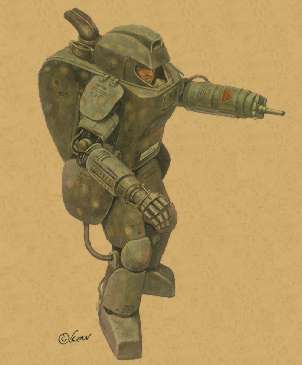|

|
| |
| 1,007 - 3,321 |
| 1 |
| 0.35 tons |
| 0.81 m |
| 0.78 m |
| 1.75 - 2.05 m |
| HL62TRM(t) |
| 50 kph |
| 220 km |
| FuG5-L |
| TZF4/38 |
| 4 cm Prg.41 Laser gun |
| |
| 5 mm tungsten
10 mm armoured resin |
Image copyright by Kow Yokoyama.
|
23,491 suits of the AFS, including the Mk III, were the standard
armoured fighting suit
of the Mercenary troops in the early stages of the war. 20,992 of these
were Mk. II, a refined, more efficient, and better-armoured weapon. Out
of the rest, 2,314 were Mk I, which was the earliest prototype of the
AFS.
Although the Mk I was a little inferior to the Mk II it was greatly
invincible early on
because the Shutoral forces had no effective countermeasure. It is said
that the A.F.S Mk I was the single most important type of AFS during
the war.
The AFS was an outgrowth of a strength enhancing exo-skeleton,
which was developed by a Mercenary engineer for use in remote regions
where heavy lifting equipment wasn't available. This exoskeleton was
then covered in a layer of tungsten steel and further strengthened byt
armoured resin. A Prg.41 laser was added to the left arm as a built-in
weapon. Using the AFS Mk I's onboard fuel supply, this weapon could be
fired seven times on full anti-vehicular mode, or up to fifty times on
a smaller setting (such as against infantry). The AFS was initially
designed as a weapon for use in guerrilla style warfare, but with the
overwhelming success of the suit, it was switched to mass production.
2,314 Mk I suits were produced at the central Mercenary
production centre in a former rock salt mine situated in the North
American continent.
Only one major variation of the AFS Mk I was made, and that was
a commander's suit. The FuG8-L radio was switched with a longer ranged
FuG8-B radio. However, this was never too reliable and when these
commander suits came in for repair or maintenance, the radio was
usually switched back the more common FuG8-L.
The AFS P Polar Bear was simply the 'artic' version of the AFS,
adding better insulation and heating for the pilot and equipment.
Many AFS models had two hands, removing the arm laser and allowing for
great flexibility, although at the loss of any inbuilt weapons. These
were classified as the AFS Type E.
|